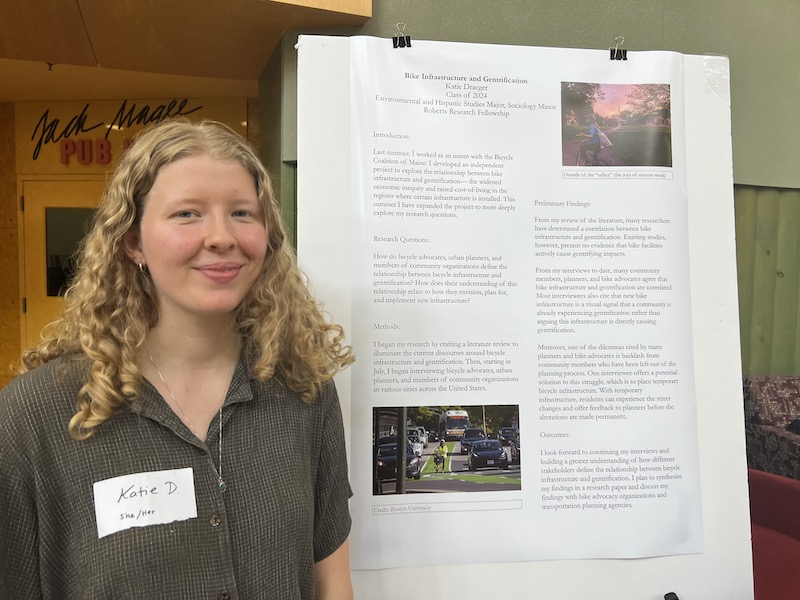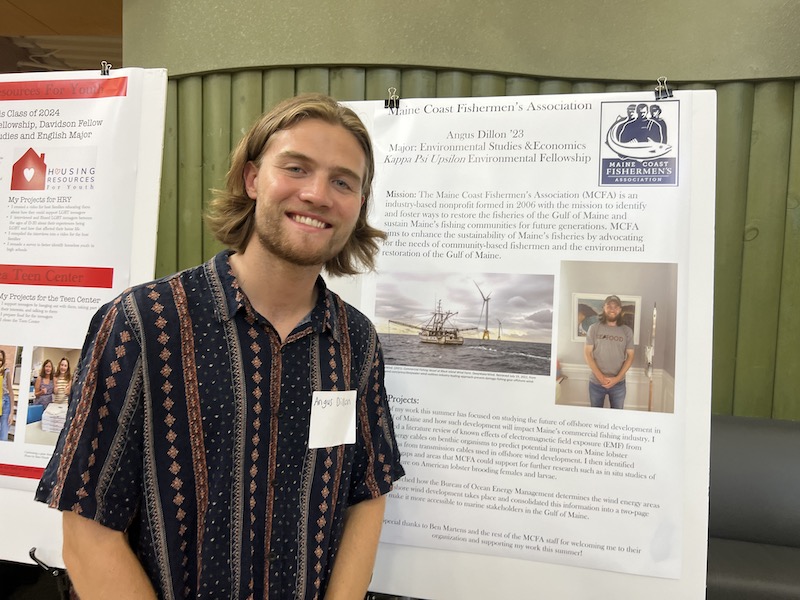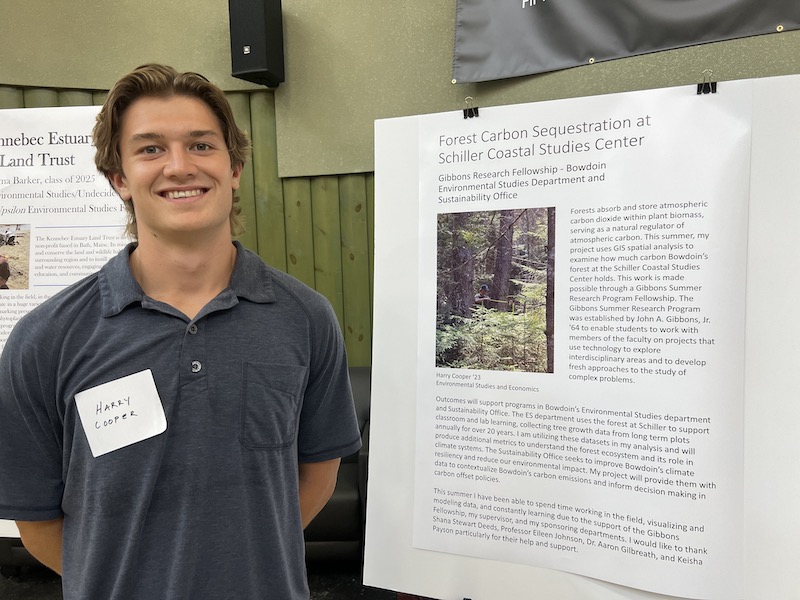With Bowdoin Fellowships, Students Pursue Environmental Questions
By Rebecca GoldfineThree environmental studies majors—Katie Draeger ’24, Angus Dillon ’22, and Harry Cooper ’22—recently presented their research at a celebration for environmental summer fellows.

Katie Draeger: Does Bike Infrastructure Cause Gentrification?
Last summer, when Draeger was interning with the Bicycle Coalition of Maine in Portland, she looked into how bike lanes factor—or don't—in community climate change plans. "My first research project with them was to create a fact sheet to help partner organizations involved in climate justice and climate mitigation understand why bike lanes are an important part of our transition to a low-carbon economy," she said.
Often, she found that city leaders, in their enthusiasm to boost electric vehicle infrastructure, overlooked the importance of bicycles in lowering emissions. But, she pointed out, "bike infrastructure, when it is paired with good public transportation and good pedestrian infrastructure, helps people not use their cars as much. Vehicle miles traveled goes down a lot."
In the course of her investigation, she also came upon another hurdle: concerns that installing bike lanes and bike racks would change the demographics of neighborhoods by attracting people with higher incomes, and so price people out of their homes.
In her analysis of the few studies she found about bike lanes and gentrification, she did see a correlation between between the two factors. "But within this limited research, I'm trying to figure out the causal direction. Perhaps it's not that bike lanes cause gentrification but that they come along in the process," she said.
She would like to continue the research as an honors project next year.
Advisor: Eileen Johnson
"What I really want taken away from my research so far is that people in communities need to have a say in what their community looks like. Participatory planning is not a favor to communities; it is favor to urban planners." — Katie Draeger ’24

Angus Dillon ’23: Electromagnetic Field Impact on Lobster
Dillon, an economics and environmental studies major, interned at the Maine Coast Fishermen's Association this summer to explore the intersection of two of his interests: fisheries and clean energy, particularly offshore wind energy.
The association is a nonprofit focused on restoring the fisheries of the Gulf of Maine and advocating for the needs of local fishermen.
For his research project, Dillon looked into the possible effects of undersea electric cables on organisms that live on the sea floor, such as crabs and lobsters—the latter being a very important commodity in Maine. As more ocean wind turbines are constructed and planned, some lobstermen have expressed concerns about deleterious impacts on lobsters and their larva.
After evaluating what literature he could find on this topic, Dillon discovered that while it is likely there were some negative electromagnetic impacts on lobster larvae exposed to electricity cables, more studies were necessary, especially ones conducted outside of the lab and in the ocean.
"There is a lot we don't know," he said, "and that is what is really scary for commercial fishermen."
Advisor: Eileen Johnson, Ben Martens ’06 (executive director of the Maine Coast Fishermen’s Association)

Harry Cooper ’22: Forest Carbon Sequestration at the Schiller Coastal Studies Center
After taking a geographic information system (GIS) class last year with Eileen Johnson in which he worked on a community-based project for a local land trust—as well as ENVS2201: Perspectives in Environmental Science —Cooper decided to look deeper into the subject this summer. With Bowdoin's sustainability office and environmenal studies, he undertook the arduous task of calculating the amount of carbon being absorbed by trees at the Schiller Coastal Studies Center in Harpswell.
"I thought it would be a fun idea, and I would learn a lot of GIS and statistics I wouldn't get exposed to in my coursework," he said. "I felt like I was stepping out of what I know—I'm an economics-focused student. And I have learned a lot about forest management and how the industry is using GIS."
He spent much of his summer in four long-term research plots at Schiller, taking new measurements of trunk diameters. Additionally, he used lidar—light detection and ranging—data to model the canopy height and other forest characteristics. Then he used his data points to extrapolate across the rest of the forest at the 118-acre center to estimate the total amount of biomass and how much carbon is held in that mass.
It is too early to reveal his results yet, as he is running his model now. The purpose of gathering this information is to potentially consider the forest as an offset for carbon emissions, and as a creative talking point, he said. "So we can say Bowdoin emits this many Coastal Studies Center's worth of emissions," he explained. "It's a way to make the idea of carbon, which is an abstract, more tangible."
Advisors: Shana Stewart Deeds, Keisha Payson, Philip Camill